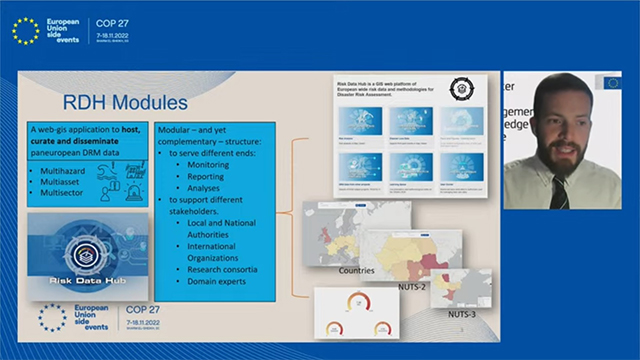The European Commission’s Disaster Risk Management Knowledge Centre - DRMKC at COP27

date: 12/12/2022
Together with six experts from different organizations , we addressed current and future risks to better understand on how recent scientific developments translate into new data and tools to help act on disaster risks.
We discussed :
- Vulnerability assessment for a better understanding of disaster losses and impacts
- How to embed climate change risks and impacts in financial risk analysis
- The links between climate change monitoring systems and humanitarian action
Andrea Salvi, from the DRMKC presented the Risk Data Hub platform and the framework that was developed for assessing and monitoring the vulnerability to Disasters in Europe. Małgorzata Osiewicz from the European Central Bank explained how the datasets from Risk Data Hub and other systems feed into the estimation of financial system exposures to climate-related risks.
Efren Feliu from Tecnalia and Zintis Hermansons from ESPON European Grouping on Territorial Cooperation discussed the characterization of climate related risks of European regions and the role of open access data in building such a collective knowledge (see New story map by ESPON on Climate impact chains and scenarios at regional level). Karmen Poljansek from the DRMKC, gave an overview of INFORM initiative and some methodological aspects of the newly released INFORM Climate Change Risk Tool.
Andrew Thow from the UN Office for the Coordination of Humanitarian Affairs (OCHA) provided insights into how INFORM Climate Change Risk helps quantify the impacts of climate and socio-economic trends on the risk of future humanitarian crises. Isabelle De Schryver from the Directorate General for Civil Protection and Humanitarian Aid of the European Commission provided an example of a concrete application of INFORM data tosupport Humanitarian Aid Funding allocation.
The common line between the systems and the frameworks that were presented is Disaster Vulnerability. The side event provided insights into the question of “Why does vulnerability matter?”. Since we cannot reduce the occurrence and severity of natural hazards, reducing vulnerability is one of the main opportunities for reducing disaster risk.
Read also the full article on JRC side events at the COP27.
Watch the recorded session here: https://digital.cop27eusideevents.eu/event/eu-side-events-cop27/planning/UGxhbm5pbmdfMTA1Mjg3Ng==
